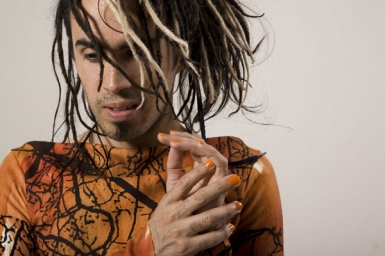Dani Umpi is an amphibian artist: he makes a point of laying bare, all of the time, his scale-covered encasing, which can be regarded as sophisticated or vulgar, brilliant or common, respectful or ridiculing. Similar to an avis rara that has feathers, chest hair, painted nails, and dreadlocks, he has been taking over the Uruguayan art scene for five years in a previously unseen manner. A creator-cum-creature, his universe combines fantasy, forgery, melodrama, and debauchery; these comprise the orbit around which his works gravitate, and based on them the artist operates and thinks about the world.
Decontextualization, humor, and heterogeneous combinations are the three pillars on which his investigations stand, as notions such as high and low culture are not only diluted, but lose any signification whatsoever.
The artist inaugurates the curatorial framework (A)Pareço, logo existo [I look, therefore I am] of the FF>>Dossier, a series presenting four Uruguayan authors who use simulation, seduction through image, and manipulation of contemporary media codes and tactics as tools and foundations for their creations.
Umpi lets himself be attracted by works that “offer a world” to the viewer. “I like the stars. If someone sings as if they were in their living room, then I am not interested. “I like to be taken somewhere.”
Do not be fooled, though, by the festive, seemingly naive stance of this author-character. Dani Umpi is the MTV award nominee singer who turns his reedy voice into a scenic asset, but he is also the writer of agile, somewhat somber novels, broadly reviewed in the Río de la Plata. On top of all that, he still emerges as an unpredictable performer, who may appear in a television show throwing vegetables on the audience.
Umpi claims that, as his layers multiply themselves and make him popular, they also protect and isolate him. His chameleon-like ability allows him to mix in and to stand out according to the circumstances.
Like a gentleman, he strolls elegantly through unexpected territories and, on his way, he “filters and deactivates the conventional devices for assimilating art,” as critic Jacqueline Lacasa wrote in the Essay for this Dossier.
To reinvent oneself continually is to exercise power, and the artist’s discourse invites the observer to perceive a world that is incoherent, and impregnated with ambiguities.
Further info on this artist available at the collection
